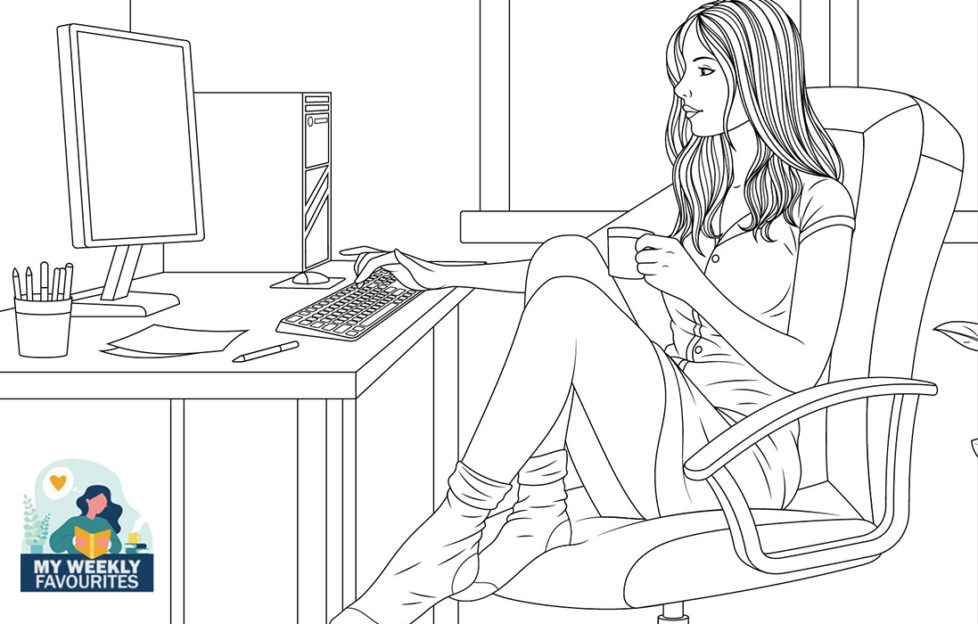Bring Back The Old Me

WRITTEN BY STEPHANIE BUTLAND
I was ready to be excellent again but I needed a hand – and the wrong coffee…
“Rosie’s a lovely name,” said Robert, the man waiting next to me at the bewildering, many-buttoned coffee machine. It was the first break on the first day of a two-day course and I was trying to work out how to get a latte and wishing that I was safe in my office.
“It is,” I said, then, trying not to sound resentful – which I was, a little, because I hate it when people get my name wrong, “It’s actually Rose.”
“Oh, I’m sorry,” he said.
“Don’t worry about it,” I answered, thinking: don’t say it, don’t say it…
But he did.
“A rose by any other name, eh?”
I made my face into the shape of a smile because that’s what you have to do, even when it’s about the four-hundredth time in twenty-eight years that you’ve heard the same joke. Still, when I turned to look at him, I realised that he wasn’t making a joke for the sake of it; he was probably as nervous in a room full of strangers as I was. I remembered him from the introduction round, not showing off or trying to make anyone laugh, his voice quiet and maybe stuttering a little.
I felt my pretend-smile turn into a real one and noticed how lovely his eyes were, brown and bright.
I’m not very good at chit-chatting at the best of times, and I couldn’t think of anything to say…
I pressed a button on the machine – any button – and the grinding and hissing made talking impossible. I watched as the mug filled, not attempting conversation.
I was just about to walk away when he spoke again.
“Mochaccino’s a bold choice.”
I laughed. I couldn’t help myself.
“I was hoping for a latte, or a flat white,” I said.
“There are a lot of buttons,” he said, with a sort of twinkle in his voice. His eyes were kind.
“Yes,” I said, “good luck.” There wasn’t a lot of space in the coffee area so I walked over to the window and looked out, hoping that I was giving a clear enough signal to the others: a polite, non-confrontational “let me be”.
I’d been offered the chance to come on this course as a way to show that I was committed to doing a good job. I’d broken up with Dale eight months before and it had hit me hard; we’d been together for nine years and losing him had turned me from someone who had a place in the world and a plan for her life into a flailing, tearful woman that even I didn’t recognise.
I cried so much that I had to start putting Vaseline on the skin under my eyes, which had become raw and painful. I had no appetite; I would get home from work and go straight to my too-big bed, shedding clothes on the way up the stairs, desperate for sleep but drifting, half-conscious, for hours while I wondered where I had gone wrong.
I didn’t want to accept that what Dale had said was probably true: we’d become a habit, we were different people to the ones who had met in a University bar at a comedy night.
I was just getting myself together again, six months on, when I found out he’d moved in with his new girlfriend.
My boss, Julia, called me in to her office.
“I’m going to be honest. It’s time to stop crying, Rose,” she said. “I know you’ve been through a tough time but the fact is, you used to be an excellent project manager, and now you’re really no more than competent. I think it’s understandable, but I think it’s time to make a change for the better. It would be a shame if you threw your career away.”
I opened my mouth to protest and then I realised she was right
I’d been ambitious, once. I’d joined the company after winning a place on the very competitive graduate fast-track programme and had whizzed through the first years of my career.
Then Dale had lost his job and struggled to find another, resenting me for doing well, although he’d never said so directly. It had been a tough time, but I’d thought we’d weather it. I was wrong about that.
I was wrong about my personal life not affecting my work, too. I’d noticed I was no longer getting the complex, important projects to manage; I had drifted to the slow lane.
Yes, Julia was right. Instead of telling her how I’d just found out that Dale had moved on in a way that made me wonder if he’d been seeing his new girlfriend before – six months wasn’t long to get over a break-up, meet someone else and move in with them – I said, “What can I do? To be excellent again?”
Julia smiled.
“That question is a good first step,” she’d said. “I think we need to work on getting your confidence back. You put in long hours, but I’m not sure you’re working as effectively as you could be. I was thinking that we’d get you on a time management course. Just to begin with.”
I’d agreed, of course.
I looked out across the London skyline until it was time to go back in to the training room. I drank in the silhouettes of the buildings, the ambition of them, the way the best of them each seemed to have their own soul. I decided it was time to forget Dale, once and
for all.
I threw myself into the course and I learned a lot about prioritising and being organised. We had to add up how much time we spent on different tasks and subtract the total from the time we spent at work, and I realised that there were at least two hours a day that I spent doing nothing meaningful.
I didn’t admit it to the group but I suspected that quite a lot of that lost time had been spent hitting “refresh” on my email or Dale’s Facebook page.
Well, no more.
The trainer mixed us into different groups for different exercises so Robert and I crossed each other’s paths often.
He was patient, listened to everyone else, and was always happy to encourage other people. He mentioned that he cycled at weekends – I thought of my mountain bike, gathering dust in the loft, and the spring that was coming – and I tried to be polite and make up for my rudeness by the coffee machine.
At the end of the second day we were all asked to say what we would do differently. We were all relaxed with each other, and jokey, by this time.
Jim, an HR manager, said that he would write things down instead of thinking he could remember them, and also continue to have a Danish pastry at half past ten every day. Melissa, an accountant, said that she felt more confident about allocating time to tasks.
When it was my turn I said, truthfully, that I would fix problems straight away instead of wasting time seeing if they would get better on their own, and that I’d never have another Mochaccino. Everyone laughed, Robert caught my eye and nodded, and I felt an odd feeling that I didn’t recognise.
Robert was last to go. When it was his turn, he said he’d make a point of being direct in his communications, as he had realised he lost a lot of time clarifying things he’d not been clear on to begin with. He added that he’d enjoyed meeting new people.
“Thank you very much, Richard,” the trainer said.
Richard? Surely I’d misheard. She must have said Robert. I was tired, I wasn’t concentrating.
As everyone began to pack their things away I moved closer to the front and sneaked a look at the delegate list on top of the trainer’s papers. Yes, there it was: Richard Leete, right under Rose Evans on the sheet we’d signed in on each day. How hadn’t I noticed?
The trainer was packing away her things. She smiled at me and said, “Fixing things right away. I hope that will have a big positive impact on your life.”
“Yes,” I agreed.
People were leaving, saying goodbye, shaking hands, exchanging business cards and promising to stay in touch.
Richard was at the back of the room, shrugging into his coat. I recognised the feeling I’d had when he nodded at me – hope, and the possibility of happiness – and walked over.
“Fixing problems straight away,” I said. “I’m so sorry I got your name wrong. For two days. I’m mortified. Especially when I was rude yesterday morning when you called me Rosie.”
Richard smiled, and his eyes looked straight into mine.
“You weren’t rude,” he said, “and anyway, I’d distracted you at an essential moment, and as a result you had to drink a Mochaccino. You would have been perfectly justified.”
I laughed. I think I’d laughed more in two days than I had in the whole of the last eight months…
“Thank you,” I said.
“No problem,” he said. He picked up his bag, smiled, and looked as if he was going to say something else. But after a moment he just put out his hand, which I shook, said goodbye and left.
I felt sadder than I probably should at the thought of never seeing him again. Still, I told myself as I waited for the lift, it was good to be reminded that there were good people in the world. Friendly, polite, good-looking men. Maybe one day I would meet one of them, get their name right, and have a happy, lasting relationship. Other people managed it.
When I got home that evening I went through the house and found the last of Dale’s things. A pair of his winter socks that had made their way into my underwear drawer, an Indian cookery book, early James Bond DVDs.
I almost texted him to come round and get them, but then I decided they could go to the charity shop. He clearly didn’t need them and, for the first time since we’d split up, I found I really didn’t want to see him.
“How did the course go?” Julia asked when I went in to the office the next morning.
“It was great,” I said. “I do feel more confident, I think there’s a lot of places I can manage my time better, and I’m ready to do an excellent job again.”
“That’s great, Rose,”
Julia replied with a smile, “because I’m giving you a new project and you’re going to need all your skills.”
I wondered if she’d have given it to me a week ago. I suspected not. The world was getting brighter.
There was a lot of email waiting for me after two days out of the office, but I got on with it, whizzing through messages quickly, clearing the decks for my new project.
I’d just got to the end when a new one was delivered. Failed the training course was in the subject line.
My new-found confidence withered. How could I have failed it? The trainer had commented that she’d seen a real positive change in me.
I clicked on the message, thinking about what Julia would say. I’d be back in the slow lane for sure.
The email wasn’t from the trainer. It was from Richard.
Dear Rose, Yesterday you said you would fix problems immediately, and when you realised you’d been calling me the wrong name, that’s exactly what you did. I said I would communicate more clearly, and I didn’t do that at all. What I really wanted to do was to ask you out for dinner (coffee optional). Richard (Robert).
I looked at my watch. I had two minutes before my project brief with Julia. Enough time to reply to an email.
Our My Weekly Favourites series of lovely short fiction from our archives continues on Mondays and Thursdays. Look out for the next one.
Don’t forget – you can find brand new, uplifting short stories every week in My Weekly magazine! Subscribe now for a great money-saving deal.




